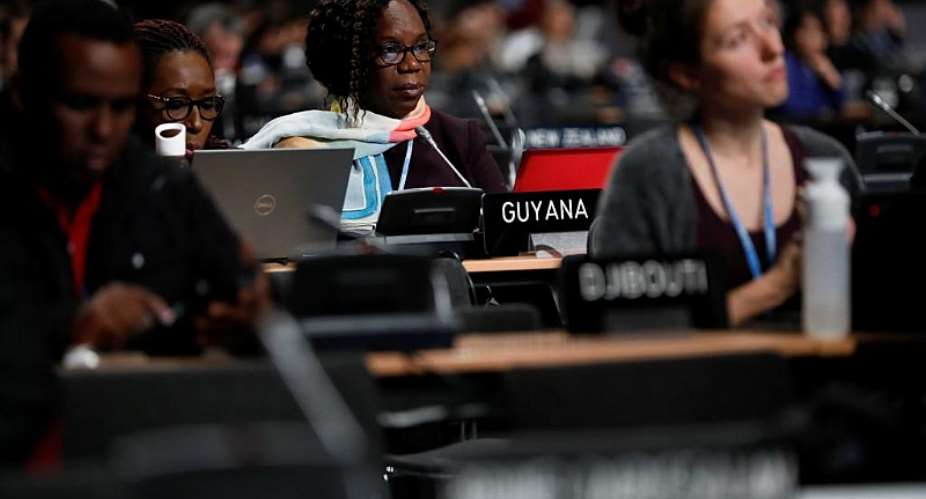Among the least responsible, but definitely vulnerable to the impacts of climate change, Africans are expecting concrete action from the Cop24 conference in Poland. Yet a transition from fossil fuels to a renewable future is proving challenging as protests against fuel tax rises in France highlight.
After weeks of violent demonstrations over fuel tax increases in France, authorities on Tuesday backed down, saying that they had heard the anger of the people.
The so-called carbon tax on vehicle fuel, slated for 1 January, was intended to combat climate change and help finance renewable energy.
Suspending it risks sapping climate action by the very country that helped ink the Paris Agreement in 2015.
In the conference halls of Katowice, where UN climate talks are underway to try and ramp up ambition, news of the French government's inability to sell its environmental policies has come as a blow and sparked some green soul searching.
"We're here trying to solve the Paris Agreement, while in Paris people who are feeling the pinch in their daily lives are saying no," said Victoria Hurth, an associate professor of marketing and sustainable business at Plymouth University in south-western England.
"They don't understand the bigger context, that we need to take action now to save bigger pain later down the line," she told RFI.
The challenge of a fair transition
France's fuel protests have pitted those who want to save the planet against those who fear for their financial livelihoods. Those economic concerns have led to calls for an oft trumpeted "just transition", a theme taken up at this year's UN climate negotiations.
Yet for a region like Africa, strongly affected by the effects of climate change , it's a challenge that doesn't make sense.
“I think the transition for developed countries in the west has to be immediate. The time is now," said Ladislaus Leonidas, a representative of the East African Community.
"We in Africa are already vulnerable. Our communities are suffering drought, floods. Anyone pulling away from the Paris Agreement will cause more problems when we already have enough.
"We have to see a clear outcome and clarity on funds. How are we are going to reach the 100 billion dollars by 2020?"
High on Africa's agenda is a pledge made in Paris, namely that poor countries would receive financial help to enable them to adapt to climate change.
Starting in 2020, rich industrial nations are expected to pay an annual amount of 100 billion US dollars. There's less than two years to go and less than 4 billion dollars has been raised.
Dodging responsibility
"I think that developed countries don't want to take responsibility for what their economies caused or for what their industries did in early times," said Isaiah Owiunji, from the World Wildlife Fund in Uganda.
"Developing countries are looking to them, saying: 'Look, during the industrial revolution you got this and this is what happened, so you have to pay for that.' I think that's one of the tensions causing the debates to be ongoing," he told RFI.
Finger-pointing, however, is not the solution.
"If we stay at this stage, in which everyone defends their own interests we are not going to make any progress," said Idrissa Zeba, the executive director of Naturama, an NGO based in Burkina Faso.
"Some small things that are done in Africa; in Burkina Faso, can affect the global climate," he told RFI, referring to unsustainable land use that has seen dozens of forests depleted in Africa.
"If we don't change the way we are producing our crops or the way we are damaging the environment, things will continue decreasing," he said. "We are all in the same boat. We need this boat to stay afloat."





 Recently dismissed Weija-Gbawe MCE dead
Recently dismissed Weija-Gbawe MCE dead
 A/R: We’ll engage people to catch stray cattle to protect trees – Simon Osei-Men...
A/R: We’ll engage people to catch stray cattle to protect trees – Simon Osei-Men...
 Kumasi traders threaten to campaign against NPP over abandoned markets
Kumasi traders threaten to campaign against NPP over abandoned markets
 Bawumia to tour Bono and Ahafo regions
Bawumia to tour Bono and Ahafo regions
 Fire destroy structures at Saban Park in Chorkor
Fire destroy structures at Saban Park in Chorkor
 Military-ruled Chad votes for president in bloody transition
Military-ruled Chad votes for president in bloody transition
 Election 2024: NPP done so much and deserves victory — Akufo-Addo
Election 2024: NPP done so much and deserves victory — Akufo-Addo
 AG has 'killed' Cecilia Dapaah matter; 'abrupt end' fits clearing-agent pattern—...
AG has 'killed' Cecilia Dapaah matter; 'abrupt end' fits clearing-agent pattern—...
 Former Weija-Gbawe MCE Patrick Kumor dies
Former Weija-Gbawe MCE Patrick Kumor dies
 French banks exit from Africa will create opportunities for local banks — Fitch ...
French banks exit from Africa will create opportunities for local banks — Fitch ...
